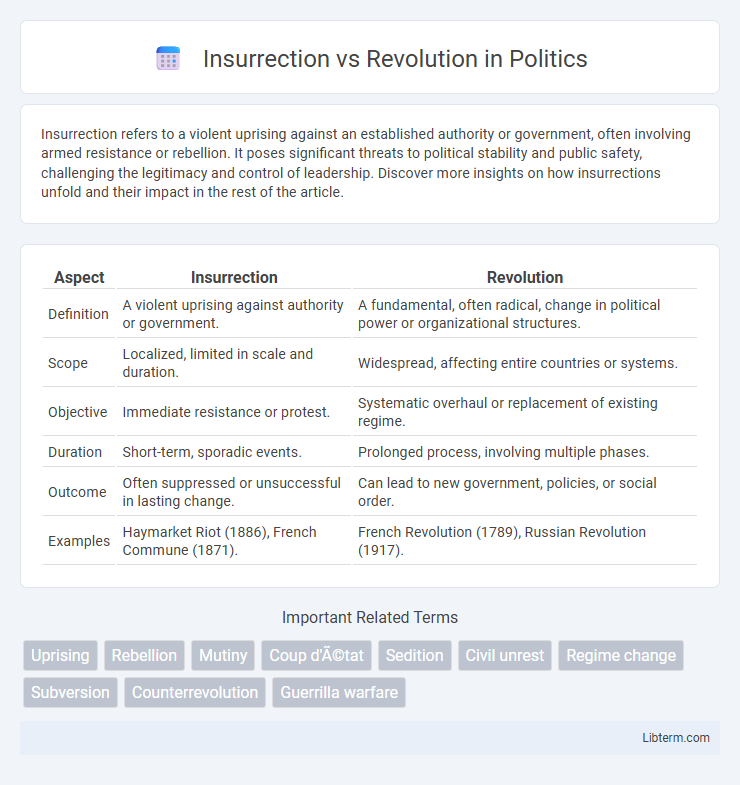Insurrection refers to a violent uprising against an established authority or government, often involving armed resistance or rebellion. It poses significant threats to political stability and public safety, challenging the legitimacy and control of leadership. Discover more insights on how insurrections unfold and their impact in the rest of the article.
Table of Comparison
| Aspect | Insurrection | Revolution |
|---|---|---|
| Definition | A violent uprising against authority or government. | A fundamental, often radical, change in political power or organizational structures. |
| Scope | Localized, limited in scale and duration. | Widespread, affecting entire countries or systems. |
| Objective | Immediate resistance or protest. | Systematic overhaul or replacement of existing regime. |
| Duration | Short-term, sporadic events. | Prolonged process, involving multiple phases. |
| Outcome | Often suppressed or unsuccessful in lasting change. | Can lead to new government, policies, or social order. |
| Examples | Haymarket Riot (1886), French Commune (1871). | French Revolution (1789), Russian Revolution (1917). |
Definition of Insurrection
Insurrection refers to a violent uprising against an established authority or government, often characterized by spontaneous and localized acts of rebellion without a broad, organized plan. It differs from a revolution in scale and scope, as insurrections typically lack the widespread popular support and structural change aimed for in revolutions. Insurrections challenge authority through direct confrontation, but may not result in systemic political transformation.
Definition of Revolution
A revolution is a fundamental and rapid transformation in political power or organizational structures, often driven by mass mobilization and widespread social, economic, or ideological demands. It typically aims to completely overthrow an existing regime or system, replacing it with a new governance model or societal order. Unlike an insurrection, which may be localized and sporadic, a revolution involves coordinated efforts and significant shifts in authority and legitimacy.
Key Differences Between Insurrection and Revolution
Insurrection involves a spontaneous and often violent uprising by a group aiming to challenge authority or government control, typically limited in scope and duration. Revolution represents a fundamental and sustained transformation of political, social, or economic structures, often resulting in systemic change and broader societal impact. While insurrections are usually localized and reactive, revolutions are comprehensive movements driven by ideological shifts and mass participation.
Historical Examples of Insurrections
The Whiskey Rebellion of 1794 in the United States exemplifies an insurrection where citizens violently protested federal excise taxes without seeking to overthrow the government entirely. The Paris Commune of 1871 in France involved a radical uprising that temporarily controlled the city but did not achieve complete political revolution. Insurrections typically feature localized, spontaneous uprisings, unlike revolutions such as the American or French Revolutions that result in profound systemic change.
Historical Examples of Revolutions
Revolutions such as the French Revolution (1789), the American Revolution (1775-1783), and the Russian Revolution (1917) showcase profound social, political, and economic transformations, often overthrowing established governments. These upheavals involve mass mobilization, ideological shifts, and systemic change compared to insurrections, which tend to be localized, short-term acts of rebellion without comprehensive restructuring. The extensive impact and ideological foundations distinguish revolutions as pivotal historical events shaping nations and global history.
Causes and Motivations Behind Insurrections
Insurrections often arise from immediate grievances such as political oppression, economic hardship, and social injustice, triggering spontaneous or organized uprisings against established authority. Unlike revolutions, which typically involve a broader ideological or systemic change aiming to overhaul political and social structures, insurrections are frequently motivated by specific issues or localized discontent. The underlying causes of insurrections include exclusion from power, corruption, and unmet demands for civil rights, which fuel collective frustration and a desire for rapid, sometimes violent, change.
Causes and Motivations Behind Revolutions
Insurrections often arise from immediate grievances such as economic hardship or political oppression, while revolutions stem from deeper systemic issues and a widespread desire for comprehensive social, political, or economic transformation. Motivations behind revolutions typically include long-term injustice, inequality, and the demand for fundamental change in governance or societal structures. Key causes involve the collapse of legitimacy in ruling institutions, oppressive regimes, and the rise of revolutionary ideologies advocating for radical reform or overthrow.
Outcomes and Consequences: Insurrection vs Revolution
Insurrections often result in short-term disruptions with limited systemic changes, frequently leading to increased government repression, arrests, or localized instability. Revolutions typically produce profound and lasting transformations in political, social, and economic structures, sometimes ushering in new regimes, legal frameworks, or shifts in power dynamics. The scale and organization of revolutions foster broader consequences such as institutional reform or nation-state redefinition, unlike insurrections which primarily highlight immediate dissent without fundamental change.
Legal and Political Perspectives
Insurrection refers to a violent uprising against existing authority typically deemed illegal and subject to criminal prosecution under national laws, whereas a revolution often involves a fundamental political and social transformation recognized as legitimate or necessary by a significant portion of the population. Legally, governments classify insurrections as breaches of peace or rebellion, leading to punitive measures, while revolutions can result in the establishment of new legal frameworks and political regimes. Politically, insurrections challenge authority without necessarily aiming to overhaul the entire system, whereas revolutions seek systemic change, often gaining broader ideological and popular support that reshapes governance structures.
Modern Implications and Contemporary Cases
Insurrection refers to a localized, often spontaneous uprising against authority, typically lacking widespread coordination, while revolution involves a fundamental, organized overhaul of political or social structures. Modern implications of insurrections highlight challenges in law enforcement and counterterrorism, as seen in urban riots or armed rebellions like the 2021 Myanmar coup resistance. Contemporary revolutionary movements, such as the Arab Spring, demonstrate the power of digital mobilization and global media in reshaping governance and catalyzing systemic change.
Insurrection Infographic

 libterm.com
libterm.com